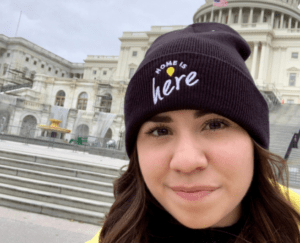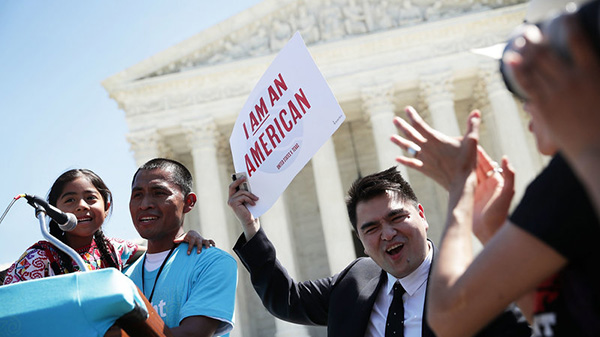Wanting secure borders and other controls shouldn’t require Americans to judge immigrants harshly or use denigrating language to label them, a DACA recipient said during a national immigration forum Aug. 11.
“Even if people … can’t understand immigrants or why someone would choose to be undocumented and persist through that, I would hope that people understand the humanity of the people at the core of immigration issues,” said Nori, undocumented immigrant brought to the U.S. by her family from Venezuela in 2001 when she was 4.
“There are a lot of words that people use to intentionally dehumanize immigrants, and I think that’s where it’s really painful,” she said during a livestreamed webinar titled, “What It’s Really Like to Be A Dreamer.” The event was sponsored by Women of Welcome, an evangelical ministry devoted to applying Scripture and compassion to the treatment of immigrants and refugees.

Nori
During her interview by ministry team member Sarah Quezada, Nori delved into her experiences growing up in a family without legal status and the ways that affected her self-esteem, family and social life growing up. She described how her undocumented status slowly but painfully dawned on her as an adolescent, and how the eventual implementation of the Deferred Action for Childhood Arrivals program, or DACA, transformed her personal, educational and even spiritual outlook.
“I remember being so excited and falling to my knees in sheer gratitude that something was happening, anything, to throw me a lifeline before I drowned,” she said of the Obama-era policy that shields immigrants raised in the U.S. from deportation and allows them to drive, work and continue education. “That light came back into my eyes. I had a reason to live.”
The desire to live is what drove her parents to leave the political and economic turmoil of Venezuela, Nori said. After settling in Utah, the first hint of the family’s precarious legal status came when their visas began to expire, causing them to lose health and dental insurance.
“Our parents took us to get our teeth cleaned,” Nori said of she and her brother. “And I just remember them picking us up from school and it being this big deal that we were going to the dentist because we don’t know when we are going to be able to come back. That was the first time I realized something is going on here.”
As a seventh grader, she watched her brother, who is five years older, confront barriers to work and college after graduating from high school. Another time, the family had to drive him several hours to a mission trip because his undocumented status prevented him from flying.
“Things like that just started coming up and I started putting some pieces together — like, our situation here isn’t secure.”
Making those connections led Nori to hide her undocumented status from friends, teachers, guidance counselors and anyone else outside the family.
By 12, and having moved to a majority white school, Nori said she became acutely aware of being racially different. But it was media that made her aware that, “Oh, I’m the immigrant they are talking about in the news, I’m the illegal immigrant trying to steal jobs.”
Making those connections led Nori to hide her undocumented status from friends, teachers, guidance counselors and anyone else outside the family.
But that secrecy had its consequences, too. It contributed to increasingly awkward situations as she and her friends progressed through high school. “It was so hard always having to find a reason for why I didn’t have a (driver) license when my friends did.”
It also was a challenge to explain why she wasn’t applying for college scholarships and why she was removed as president of the National Honor Society during her junior year.
“Why was I, all of a sudden, failing classes when I was a straight-A student? It was because I thought what’s the point of school when I’m undocumented and can’t go to college? I couldn’t explain those things to anyone. I couldn’t be who I really was, and I couldn’t talk to anyone about it.”
Nor could she talk about it at home. “My parents didn’t understand what it was like to be a 16-year-old girl surrounded by different people who didn’t understand the intricacies of the immigration process or why I was undocumented.”
But then a came a light at the end of the tunnel. “Thankfully, just a few months later, that is when DACA was introduced and that’s what brought me out of that darkness,” she said.
The constant attacks on DACA are just another blow to already battered Dreamers who “are at the mercy of an often-merciless system.
After Obama left office and Donald Trump became president, her situation took a turn for the worse. Trump tried to kill DACA in 2017 but was overruled by the U.S. Supreme Court in June 2020. However, the Trump administration later required recipients to renew enrollments annually instead of biennially, as was previously mandated.
The latest threat to DACA came this July when a federal judge in Texas ruled it to be illegal and ordered the Biden administration to stop taking new applications. The decision does not affect Nori and nearly 650,000 other existing Dreamers.
Dreamers have met with President Biden multiple times to pressure the White House and Congress to enact legislation codifying DACA and add to it legal residency and eventual eligibility for citizenship. They have been joined in that effort by numerous religious organizations and other grassroots groups who have held webinars, submitted petitions and letters pleading for just and humane treatment of immigrants who have only known the United States as home.
But there has been no movement, so far. The American Dream and Promise Act of 2021, which also would extend similar protections to Temporary Protective Status and Deferred Enforced Departure holders, has passed the U.S. House but languishes in the Senate, where anti-immigration Republicans are blocking it. Some religious and political leaders are pushing to have DACA added to federal spending legislation in the form of amendments.
But the constant attacks on DACA are just another blow to already battered Dreamers who “are at the mercy of an often-merciless system,” said Nori, who explained why she now has chosen to speak out. “I realized because I had DACA as safety net from deportation that I needed to speak up and share my story because closeting my feelings was not only harmful to me but robbing people around me from getting to know who I really was.”
Nori added that her Christian faith offers another sanctuary. “The gospel really provided this safe place for me. A belief in God is what brought my parents to the United States.”
Related articles:
Biden administration rushing to strengthen DACA, official says
Dreamers want White House and Congress to do more for their protection
She’s pro-life and pro-immigrant and trying to bring other evangelical women along

